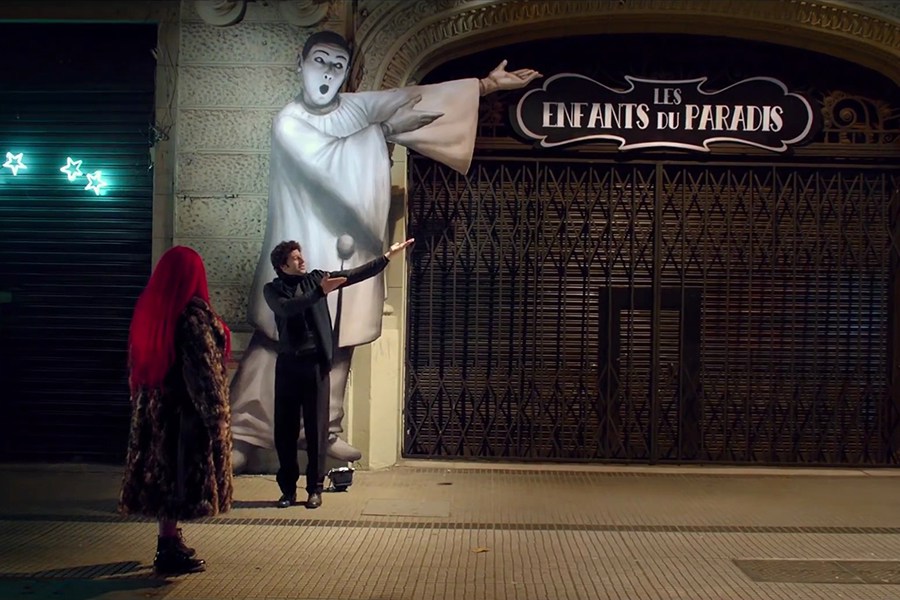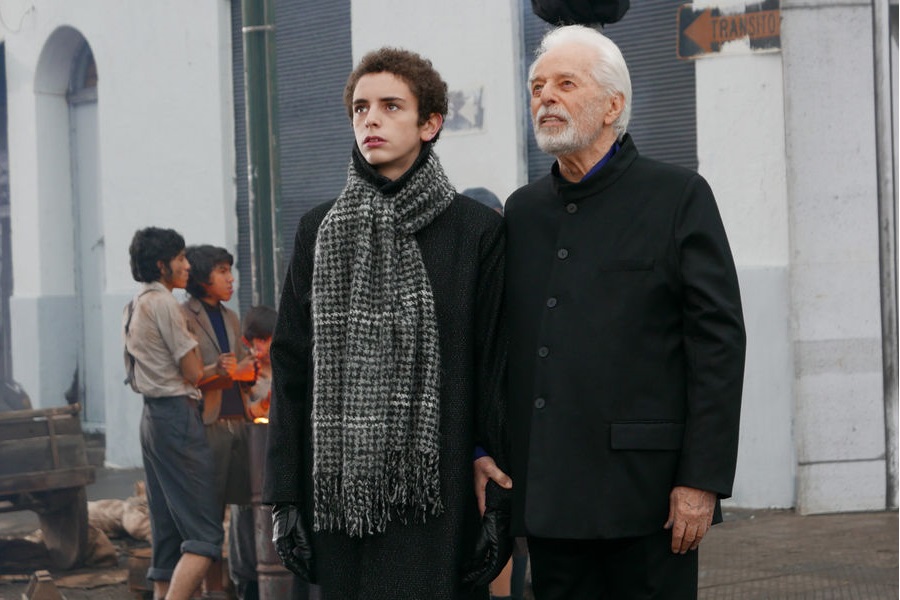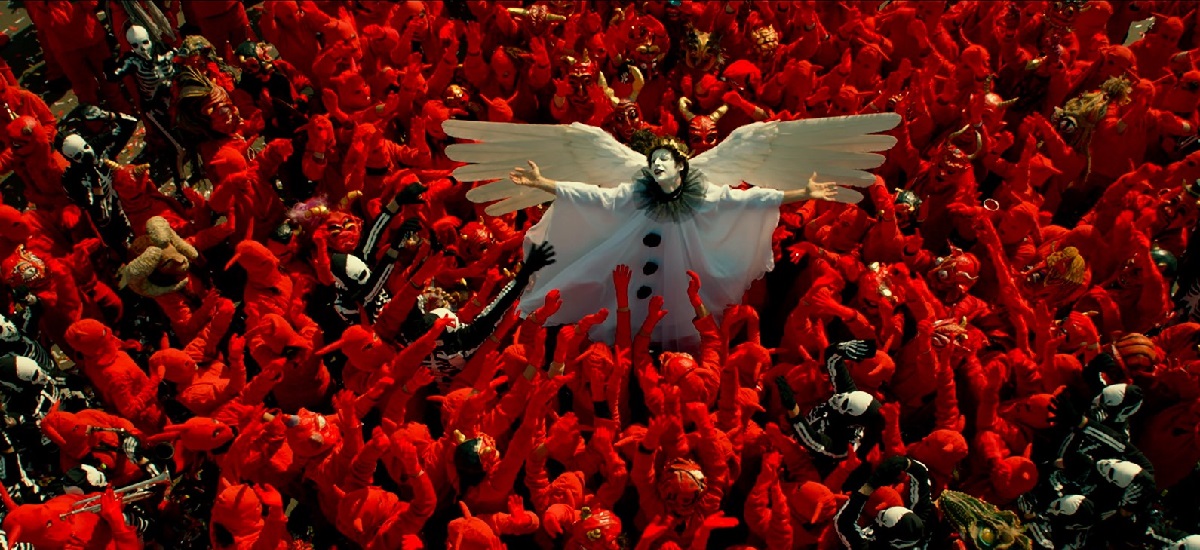Alejandro Jodorowsky simply cannot be stopped. At 88 years old, the master of the surreal is still at the top of his game, creating with the fervency of someone a quarter the age. Every trick he’s ever learned comes to a head in Endless Poetry, a staggeringly wonderful work held back only by extensive fits of self indulgence.
Endless Poetry is a sequel of sorts to the semi-autobiographical Dance of Reality, the second of his planned pentalogy (see, literally no stopping him), each capturing a different period in the director’s life. Whereas the first film captured his early life in Tocopilla, we now find young Alejandro (Jermias Herskovits) as he navigates the throws of budding artistry clashing with the traditional ideals of the family. His father (Brontis Jodorowsky, the eldest son) wants to instill machismo in his son, pushing him towards the life of a doctor. His mother (Pamela Flores), who only speaks in operatic trills, combats this with her desire for him to be classical musician. Unsure of what to do, a bum imparts jumbled slurred wisdom in his ear. Suddenly, the real Alejondro appears stating on-screen stating “that drunk, whom wine had made a prophet pulled me out of the abyss with a single sentence.” It’s the first of numerous interjections the elder statesman makes, framing pivotal points in his journey. Faced with knowing that a realm of possibility exists beyond what he’s been told, he rejects normality, having a breakdown of sorts at a family function.
Unsure of what to do, a bum imparts jumbled slurred wisdom in his ear. Suddenly, the real Alejondro appears stating on-screen stating “that drunk, whom wine had made a prophet pulled me out of the abyss with a single sentence.” It’s the first of numerous interjections the elder statesman makes, framing pivotal points in his journey. Faced with knowing that a realm of possibility exists beyond what he’s been told, he rejects normality, having a breakdown of sorts at a family function.
By shutting the door on a conventional life, he emerges a man (Adan Jodorowsky, the youngest son) ready to enjoy the life of an artist in Santiago, Chile. Throughout his journey of exploration Alejandro ends up brushing shoulders with prominent members of Santiago’s scene from the 40’s and 50’s. He’s seduced by Stella Diaz Varin (Flores, again), becomes best friends with Enrigue Lihn (Leandro Taub), as well as gains advice from Nicanor Parra. Everything that occurs would have a twinge of Forrest Gump to the proceedings were it not for Jodorowsky at the helm. Under his command, the mundane becomes mesmerizing, the dour becomes delicious. The act of a tarot reading features a naked man along with interpretive dance. Stagehands clad all in black appear from thin air to both take props from actors and to place them about as needed. City blocks are covered in black and white paper store fronts to give the illusion of the past. A circus performance turns into the exposing of one’s soul, as the hero rides the wave of an audience. All of this is rendered wonderfully in part to Adan’s charming central performance.
Under his command, the mundane becomes mesmerizing, the dour becomes delicious. The act of a tarot reading features a naked man along with interpretive dance. Stagehands clad all in black appear from thin air to both take props from actors and to place them about as needed. City blocks are covered in black and white paper store fronts to give the illusion of the past. A circus performance turns into the exposing of one’s soul, as the hero rides the wave of an audience. All of this is rendered wonderfully in part to Adan’s charming central performance.
Flights of fancy and surrealism truly have the run of the film. The fantastical and the ability to laugh at this heightened state work in the film’s favor, having long been staples of the director’s work. Doing so also makes the pontificating appear that much more palatable. Arguably the most accessible of his works, this Jodorowsky effort may still alienate those not accustomed to the “art” in arthouse.
What’s less forgivable is that many instances end up dragging or wallowing too much in self indulgence. It’s here Endless Poetry lets the best of its intentions get the better of things. While he draws from inspiration of his life, or some facsimile thereof, the message or importance he hopes to hit home continually cover the same ground. It’s a potentially necessary casualty when it comes to putting on a display such as this. Repetition does threaten to stall Endless Poetry, even in the liveliest of passages. Thankfully, the theatricality keeps it afloat, an act Jodorowsky is readily happy to lean upon, as if he understands his own mortality. If this is his last gasp, his moment to make a final statement or exclamation, he should be pleased. It’s a monumental achievement, at times coming across as a more unhinged variation of Fellini’s best works.
Repetition does threaten to stall Endless Poetry, even in the liveliest of passages. Thankfully, the theatricality keeps it afloat, an act Jodorowsky is readily happy to lean upon, as if he understands his own mortality. If this is his last gasp, his moment to make a final statement or exclamation, he should be pleased. It’s a monumental achievement, at times coming across as a more unhinged variation of Fellini’s best works.
“You will learn to die in happiness,” the omniscient Jodoroswky says to his younger self, in a moment of uncertainty. When he is asked back about the meaning of life, his elder self only replies with one word: “Life.” The act of examining one’s history is a tenuous task, as most are given either to hyperbole, misrememberings or alterations of the facts. There is a sense that all three may be at work here, letting imagination run wild, as opposed to worrying about minutiae. Everyone wants to be the hero in their mind, so why should it be any different when capturing that essence on film? With Endless Poetry, Alejandro Jodorowsky has made a work of art, a beautiful, haunting, hilarious film that is the perfect culmination of all his work. It may not be the most important film of the year, but it’s certainly one of the best.


